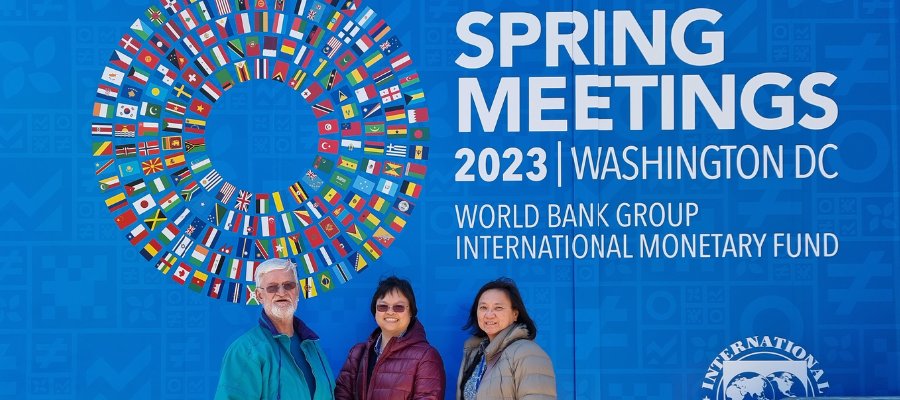
Spring arrived early in Washington, DC, hence we missed the cherry blossoms except for a small area near the train tracks. It was my first time to attend the World Bank (WB) and International Monetary Fund (IMF) Spring Meeting that was held from April 10-14. I went with the other members of the NGO Committee on Financing for Development (NGO FfD) to understand the current economic situation and advocate, together with other NGOs, for the restructure of the current global economic system.
These two Bretton Woods Institutions (WB and IMF) were established in 1944 to help rebuild the shattered postwar economy and to promote international economic cooperation. Their roles have since evolved to assisting in the reduction of poverty by lending money on short or long term to the governments of member nations to improve their economies and to improve the standard of living of their people.
There were numerous side events on topics related to achieving the different SDGs especially poverty, gender equality and climate change. Aside from the different departments of both WB and IMF, other UN agencies, Member States, Development and Private Banks and other stakeholders hosted events and there was also the Civil Society Forum. We attended a number of these events, and it was interesting to learn of the different actions and differing views on the causes of the issues and the solutions for a better world.
The Civil Society Forum provided an opportunity for NGOs and other stakeholders, including Member States and UN agencies to discuss issues and highlight solutions that are already being implemented on the ground. There were also numerous events highlighting innovative solutions including the use of digital technologies and digital currencies. However, there were also those who were alerting us to the dangers that comes with digitalisation and to consider those who continue to be left behind.
One of the events I attended was on “Tackling Legal Impediments to Women in Employment Spaces” where two IMF researchers shared that their research demonstrated that legal reform can be used to change attitudes and behaviour and is effective in tackling gender equality in the workplace. They mentioned six countries (Iceland, Peru, Rwanda, The Philippines, Tunisia, and the United States) where legal reforms in areas such as in inheritance, tax, labour, and property were implemented and how it helped achieve women’s economic empowerment. We know the statistics: 132 years to address the pay gap, 300 years for gender parity, etc. It was heartening to learn that changing laws can address the economic gender inequality.
I also attended an event hosted by Friedrich-Ebert-Stiftung (FES) and American Federation of Labor and Congress of Industrial Organizations (AFL-CIO), held at the AFL-CIO building, on “How Governments can Respond to the Cost-of-living Crisis.” The speakers came from the Trade Union, local NGOs, economist and UN agencies sharing their experiences and expert opinion on the current inflation experienced globally. One expert stated that unlike previous year’s inflation, this was not due to wage increases but due to supply chain issues. Despite the last 30 years of economic prosperity, wage increases did not happen. It was argued that for governments and Central Banks to try to address inflation by increasing interest rates will not work. It is better to address the supply bottlenecks. One speaker reminded that the last time the world faced a similar inflation situation, governments tackled it by rationing not leaving markets to correct it.
They stressed that it is important for policy makers not to allow wages to stagnate again due to inflation and provide social protection to assist the majority of low-income people from low- and medium-income countries. They are the ones impacted by inflation, energy and food crisis and the worsening debt crisis. They called for international tax reforms, and for Development Banks (including WB and IMF) to provide affordable lending rates and consider providing grants rather than loans to low-income countries.
Almost everyone agreed that the current system is broken and instead of addressing poverty and inequality, it has exacerbated it. There is a growing call for systemic change in the current global economic model and the WB and IMF funding model that while it had improved the economy of some countries, it has exacerbated the situation of most low-income countries. It was important for us who are advocating for achieving the SDGs to understand how the global economy operates and how these goals are financed.
Author: Janet Palafox ibvm
Photos: Janet Palafox ibvm, Fr. Daniel LeBlanc OMI and Marides Santos SSpS (NGO Representative of VIVAT International)


